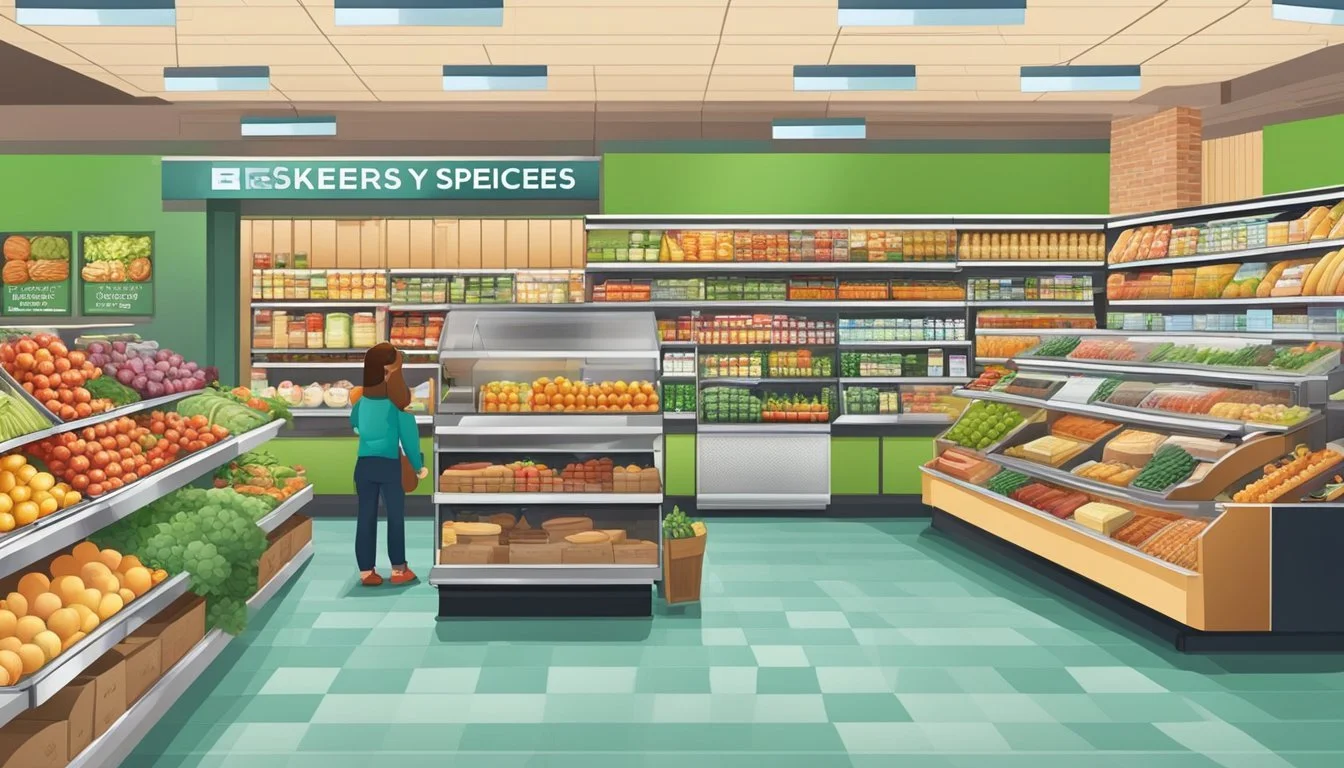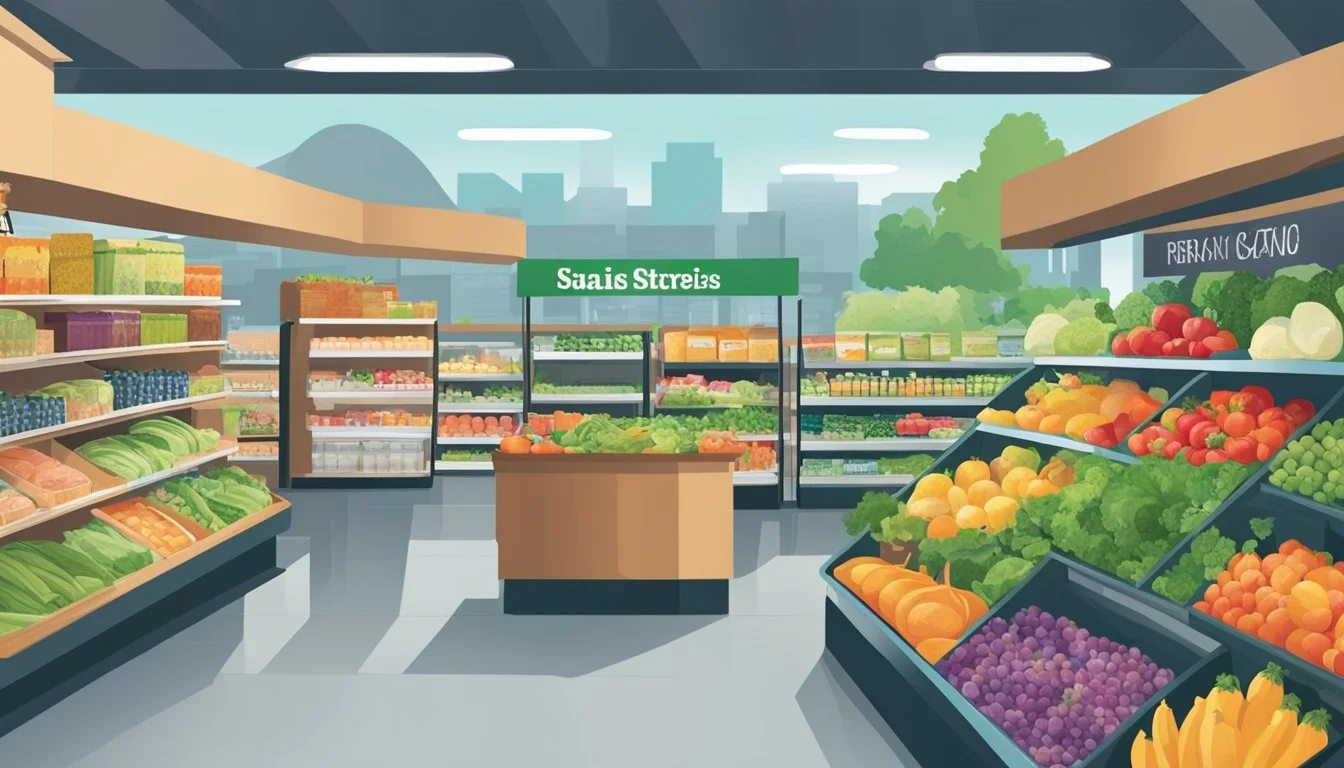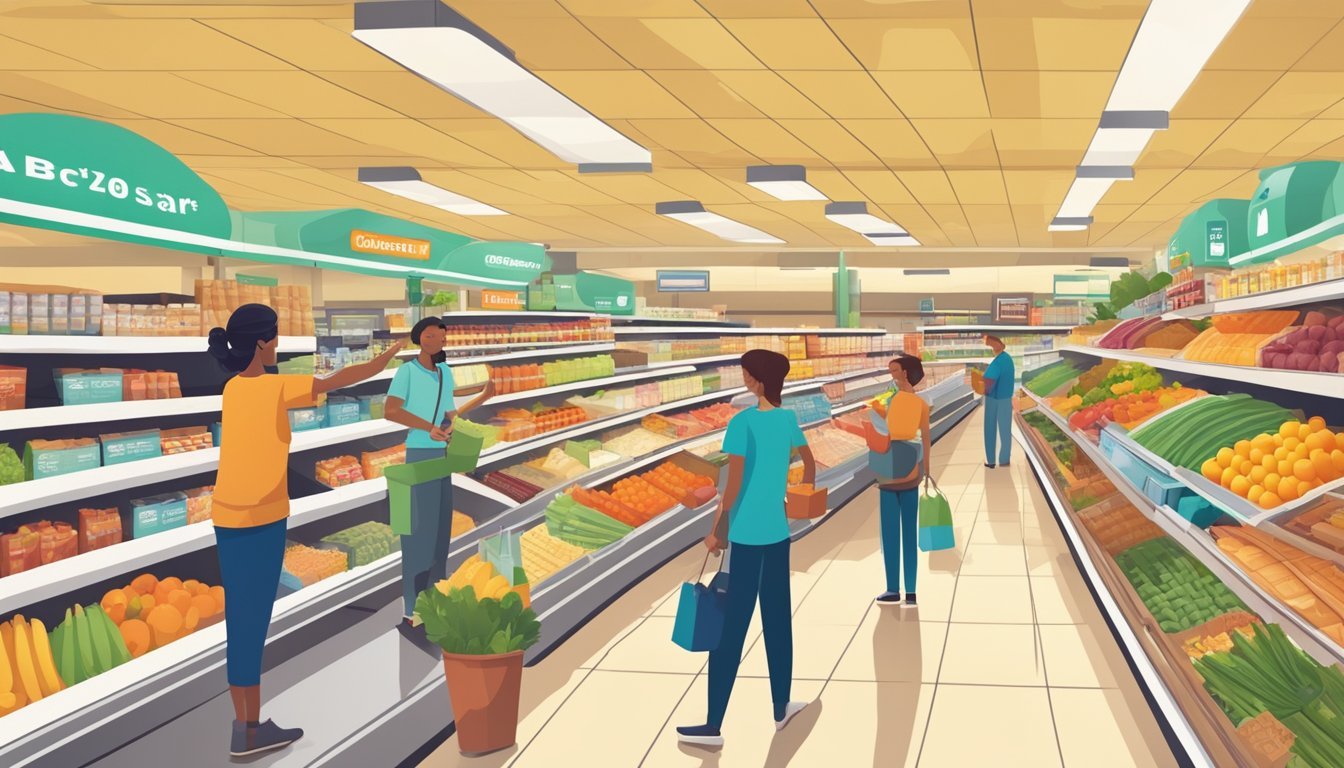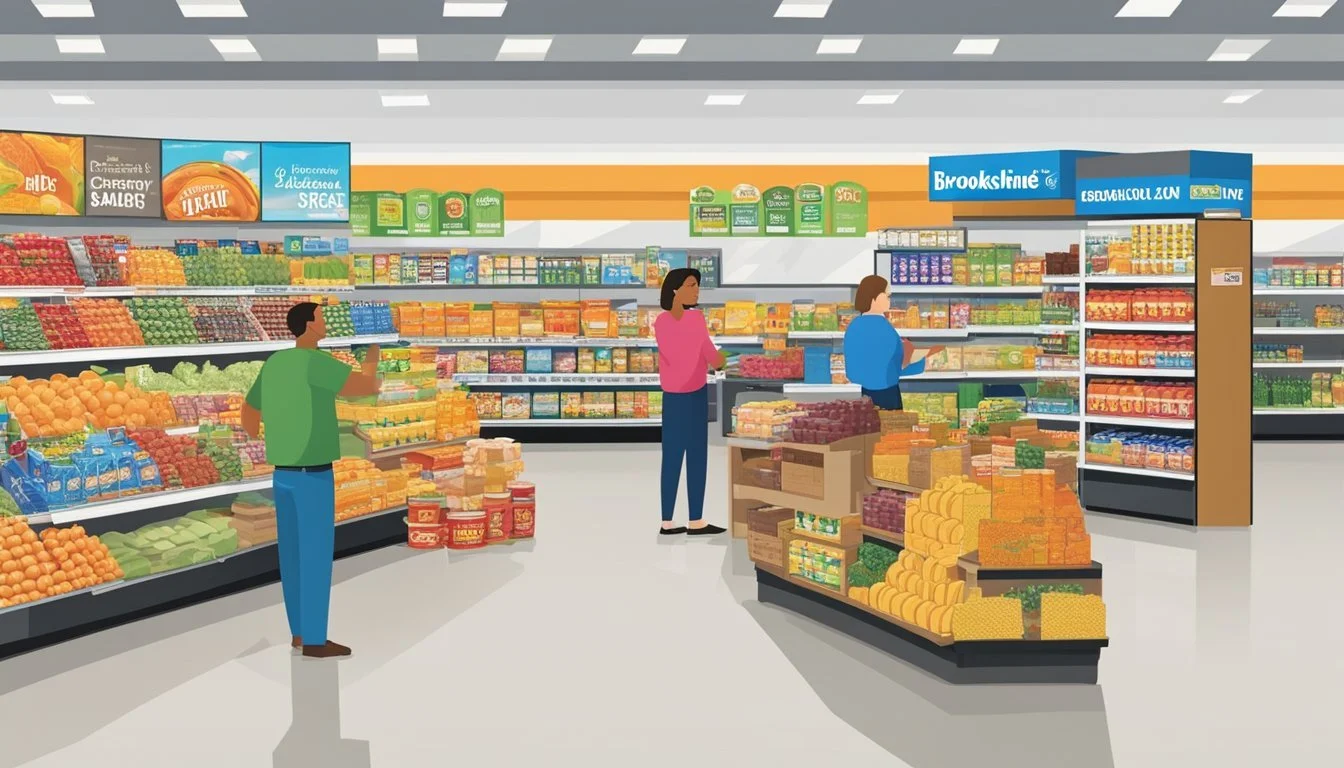Brookshire Grocery Company vs Food Lion
A Comprehensive Comparison of Prices, Quality, and Selection
Brookshire Grocery Company and Food Lion are two prominent players in the competitive U.S. grocery market. Both chains have established strong regional presences, with Brookshire's operating primarily in Texas, Louisiana, and Arkansas, while Food Lion serves customers across 10 Southeastern and Mid-Atlantic states.
Food Lion boasts a larger footprint with approximately 1,100 stores and 60,000 employees. The chain is known for its competitive pricing, particularly on produce items. Food Lion's store brand offerings often match the quality of bigger brands at lower prices, making it an attractive option for budget-conscious shoppers.
Brookshire's, though smaller in scale, focuses on providing a personalized shopping experience with an emphasis on customer service. The company operates several store formats, including upscale FRESH by Brookshire's locations. While both chains have their strengths, the better choice ultimately depends on individual preferences for pricing, product selection, and store atmosphere.
History and Evolution
Brookshire Grocery Company and Food Lion have rich histories spanning nearly a century. Both companies started as small local stores and grew into influential regional chains, shaping the grocery landscape in their respective areas.
Founding and Expansion
Brookshire Grocery Company began in 1928 when Wood T. Brookshire opened a 25x100-foot store in Tyler, Texas. Initially part of Brookshire Brothers, the company split off in 1939 to form its own entity. Wood T. Brookshire's vision drove the company's growth throughout east Texas.
Food Lion's roots trace back to 1957 in Salisbury, North Carolina. Founded as Food Town by Wilson Smith, Ralph Ketner, and Brown Ketner, the company focused on providing low prices to attract customers. This strategy proved successful, leading to rapid expansion across the Southeastern United States.
Brand Development
Brookshire's maintained its family-owned identity, emphasizing customer service and community involvement. The company developed various store formats to cater to different market needs, including Brookshire's Food & Pharmacy and Super 1 Foods.
Food Town rebranded as Food Lion in 1983 to facilitate expansion and avoid confusion with other similarly named chains. The lion logo became a recognizable symbol in the Southeast. Food Lion's commitment to low prices remained central to its brand identity.
Market Influence
Brookshire's became a significant player in the Texas and Louisiana grocery market. Its regional focus allowed for tailored offerings and strong community ties. The company's employee-ownership model, implemented in 1999, further strengthened its local appeal.
Food Lion's aggressive expansion in the 1980s and 1990s made it a major force in the Southeast. The chain's low-price strategy influenced competitors and shopping habits in the region. Despite challenges in the 1990s, Food Lion adapted and remains a prominent grocery retailer in its markets.
Store Offerings and Services
Brookshire Grocery Company and Food Lion offer diverse product selections and services to meet customer needs. Both chains strive to provide quality goods and convenient shopping experiences, though their specific offerings may differ.
Product Variety
Brookshire Grocery Company boasts a wide range of products across departments. Their stores feature extensive produce sections with fresh fruits and vegetables. The meat department offers various cuts of beef, pork, and poultry. Dairy cases are stocked with milk, cheese, and yogurt options.
Food Lion also provides a comprehensive product selection. Their produce departments emphasize locally sourced items when available. Meat counters include both traditional and specialty cuts. The dairy section stocks national brands alongside Food Lion's private label options.
Both chains carry dry goods, canned foods, and frozen items. They also stock household essentials and health and beauty products.
Quality of Goods
Brookshire Grocery Company prides itself on offering high-quality products. They source fresh produce from local farmers when possible. Their meat departments feature USDA-graded beef and hand-trimmed cuts.
Food Lion focuses on providing quality at affordable prices. They implement strict quality control measures for their private label products. Food Lion's produce undergoes regular freshness checks to ensure customer satisfaction.
Both chains adhere to food safety standards and aim to deliver fresh, quality goods to their customers.
Store-Prepared Foods
Brookshire Grocery Company often includes full-service delis in their stores. These offer made-to-order sandwiches, hot meals, and prepared salads. Many locations feature in-store bakeries producing fresh bread, cakes, and pastries daily.
Food Lion typically provides a more limited selection of prepared foods. Their deli counters offer sliced meats and cheeses. Some stores include hot food bars or grab-and-go meal options.
Both chains strive to cater to busy customers seeking convenient meal solutions.
Additional Services
Brookshire Grocery Company offers pharmacy services in many locations. Customers can fill prescriptions and receive medication counseling. Some stores provide fuel stations for added convenience.
Food Lion focuses on core grocery services but has expanded its offerings. Many locations now feature online ordering with curbside pickup. Some stores include Western Union services for money transfers.
Both chains offer loyalty programs, allowing customers to earn rewards on purchases. They also provide weekly ad circulars to highlight sales and special promotions.
Pricing and Affordability
Brookshire Grocery Company and Food Lion employ different pricing strategies to attract customers. Both chains offer competitive prices, but their approaches to affordability vary in key ways.
Comparison of Price Points
Food Lion consistently offers lower prices compared to many competitors. Studies show Food Lion's prices are often 12 to 30 percent below average market prices in surveyed areas. This makes Food Lion an attractive option for budget-conscious shoppers.
Brookshire's pricing tends to be mid-range, falling between discount chains and premium grocers. While not the cheapest option, Brookshire's aims to provide good value through a balance of price and quality.
For a typical family spending $250 per week on groceries, switching from an average-priced store to Food Lion could potentially save $1,500 to $2,000 annually.
Discounts and Coupons
Both chains offer various discounts and coupons to help customers save money. Food Lion provides a robust digital coupon program through its MVP Card. Customers can easily load coupons onto their card for automatic savings at checkout.
Brookshire's also offers digital coupons through its mobile app. Additionally, they frequently run weekly specials and promotions on popular items.
Both stores accept manufacturer coupons, allowing customers to stack savings. Food Lion tends to have more frequent sales events, while Brookshire's focuses on everyday low prices supplemented by targeted promotions.
Brand Pricing Strategies
Food Lion emphasizes its private label products as a way to offer lower prices. These store brands are typically priced 20-30% less than national brands, providing significant savings opportunities.
Brookshire's also offers store brands but places less emphasis on them compared to Food Lion. They stock a wider variety of national brands, often at competitive prices.
Both chains use loss leaders - popular items priced at or below cost - to draw customers into stores. Food Lion is more aggressive with this strategy, frequently featuring deep discounts on staple items.
Customer Experience and Convenience
Brookshire Grocery Company and Food Lion prioritize customer satisfaction through various aspects of their store environments and services. Both chains strive to create pleasant shopping experiences while offering efficient processes and attentive staff.
Shopping Ambiance
Brookshire Grocery Company focuses on creating a warm, inviting atmosphere in its stores. The aisles are typically spacious, allowing customers to navigate comfortably. Lighting is often soft yet adequate, contributing to a relaxed shopping environment.
Food Lion, on the other hand, emphasizes a bright, clean aesthetic. Their stores often feature wide aisles and clear signage, making it easy for shoppers to find what they need. The layout is generally straightforward and functional.
Both chains aim to create a pleasant shopping ambiance, though their approaches differ slightly in style and execution.
Staff and Customer Service
Brookshire Grocery Company prides itself on friendly, personalized service. Employees are often trained to engage with customers, offering assistance and product recommendations. The company emphasizes building relationships with regular shoppers.
Food Lion focuses on efficient, courteous service. Staff members are typically readily available to help customers locate items or answer questions. The chain emphasizes quick problem-solving and minimal wait times for assistance.
Both stores strive to maintain high standards of customer service, with slight variations in their approach to customer interactions.
Cleanliness and Organization
Brookshire Grocery Company maintains clean, well-organized stores. Shelves are regularly restocked, and products are neatly arranged. The company often employs dedicated staff to ensure store cleanliness throughout operating hours.
Food Lion is committed to store cleanliness as an Energy Star partner. Their stores are typically well-lit and tidy, with a focus on energy efficiency. Aisles are often kept clear and products are logically organized to facilitate easy shopping.
Both chains prioritize cleanliness and organization, recognizing their importance in customer satisfaction and overall shopping experience.
Checkout Efficiency
Brookshire Grocery Company offers multiple checkout options, including traditional lanes and self-checkout kiosks. The company often trains cashiers to be quick and accurate, minimizing wait times during peak hours.
Food Lion emphasizes efficient transactions, offering various payment methods and often implementing queue management systems. The chain frequently updates its point-of-sale technology to streamline the checkout process.
Both stores recognize the importance of a smooth, quick checkout experience in customer satisfaction and work to minimize wait times and maximize efficiency.
Corporate Strategies and Community Impact
Brookshire Grocery Company and Food Lion employ distinct approaches to sustainability, community engagement, and brand development. These strategies shape their corporate identities and local impact.
Sustainability Initiatives
Brookshire Grocery Company prioritizes environmental responsibility in its operations. The company focuses on reducing waste, improving energy efficiency, and sourcing products sustainably. They have implemented recycling programs in stores and distribution centers.
Food Lion has launched initiatives to minimize food waste and increase energy efficiency. The chain has received ENERGY STAR certification for many of its stores, demonstrating commitment to reducing environmental impact.
Both companies work with local suppliers to reduce transportation emissions and support regional economies.
Community Involvement
Brookshire Grocery Company actively engages in community support. The company concentrates philanthropic efforts on hunger relief, education, health, child and family wellbeing, and veterans' causes. Their "Focus on the Future" scholarship program aids students pursuing higher education.
Food Lion operates the "Food Lion Feeds" program, dedicated to fighting hunger in local communities. The initiative provides meals to food-insecure families and supports local food banks.
Both chains prioritize local hiring and often participate in community events and fundraisers.
Brand Presence
Brookshire Grocery Company operates over 150 supermarkets under four banners: Brookshire's Food Stores, Super 1 Foods Stores, Olé Foods, and ALPS. This multi-banner strategy allows the company to cater to diverse market segments in Texas, Louisiana, and Arkansas.
Food Lion maintains a larger footprint with over 1,000 stores across 10 Southeastern and Mid-Atlantic states. The chain focuses on a single brand identity, emphasizing consistency and recognition across its operating area.
Both companies face competition from national chains but differentiate themselves through customer service and community connections.
Reputation and Consumer Perception
Brookshire Grocery Company and Food Lion have distinct reputations in the grocery retail landscape. Consumer surveys, industry recognition, and retail studies provide insights into how these chains are perceived by shoppers and experts alike.
Customer Surveys and Feedback
Consumer Reports rankings place Food Lion near the bottom of supermarket chains, ranking 52nd out of 55 stores evaluated. Brookshire's fares slightly better, coming in at 48th place. These rankings reflect customer satisfaction across various factors including cleanliness, product quality, and service.
Food Lion receives a Knoji score of 4.3 out of 5 based on 72 customer ratings. This suggests generally positive feedback, though there's room for improvement. Specific data on Brookshire's customer ratings is limited, making direct comparisons challenging.
Both chains face stiff competition from higher-ranked supermarkets. Customers often cite product selection and pricing as key factors in their shopping decisions.
Industry Awards and Recognition
Food Lion has earned recognition for its sustainability efforts. The company received EPA Energy Star Partner of the Year awards in 2019 and 2020 for its commitment to energy efficiency. This environmental focus may appeal to eco-conscious consumers.
Brookshire Grocery Company has been acknowledged for its workplace culture. The company has been named a Top Workplace by several regional publications. Such recognition can positively impact consumer perception, as shoppers often value companies that treat employees well.
Neither chain frequently appears among top-tier national grocery awards, which tend to favor larger or more specialized retailers.
Comparison in Retail Studies
Retail studies often group Brookshire's and Food Lion in the mid-tier of regional grocery chains. Food Lion's parent company, Ahold Delhaize, ranks higher in overall sales and market presence compared to the privately-held Brookshire Grocery Company.
Food Lion operates approximately 1,100 stores across 10 states, employing around 60,000 associates. This larger footprint gives Food Lion broader brand recognition in its operating areas.
Brookshire's smaller scale allows for a more localized approach. Studies suggest this can lead to stronger community ties in specific markets, potentially offsetting advantages of larger competitors.
Both chains face increasing pressure from discount retailers and online grocery services, impacting their positioning in recent retail analyses.
Comparison With Other Grocery Chains
Brookshire Grocery Company and Food Lion face stiff competition from both national and regional grocery chains. These competitors vary in size, product offerings, pricing strategies, and customer experience.
National Chains
Walmart dominates the grocery landscape with its massive scale and low prices. The retail giant often undercuts smaller chains on everyday items. Kroger, another major player, offers a wide selection of private label products and emphasizes fresh produce.
Costco attracts customers with bulk purchases and exclusive deals for members. Aldi focuses on no-frills shopping and rock-bottom prices on staple goods. Albertsons operates under multiple banners across the country, providing localized shopping experiences.
Trader Joe's carves out a niche with unique products and a curated selection. The chain cultivates a loyal following through friendly service and affordable prices on specialty items.
Regional Competitors
Publix dominates the Southeast with its reputation for customer service and high-quality store brands. The employee-owned company consistently ranks highly in customer satisfaction surveys.
Wegmans, primarily located in the Northeast, is known for its expansive prepared foods section and gourmet offerings. The chain's upscale image and focus on fresh items set it apart from budget-oriented competitors.
Sprouts Farmers Market targets health-conscious shoppers with an emphasis on natural and organic products. The chain's produce-centric layout and bulk bin options appeal to customers seeking healthier alternatives.
Final Assessment
Brookshire Grocery Co and Food Lion both offer unique shopping experiences. Brookshire's focuses on customer service and community involvement, while Food Lion emphasizes low prices and convenience.
Quality-wise, Brookshire's often features fresher produce and a wider selection of local products. Food Lion, however, provides consistent quality across its stores.
Pricing strategies differ between the two chains. Food Lion typically offers lower everyday prices, appealing to budget-conscious shoppers. Brookshire's may have higher regular prices but offers competitive sales and promotions.
Convenience varies by location. Food Lion operates over 1,100 stores in 10 states, providing widespread accessibility. Brookshire's has a smaller footprint but maintains a strong presence in its operating areas.
Customer service is a key differentiator. Brookshire's prides itself on personalized attention and friendly staff. Food Lion focuses on efficient service and quick checkout experiences.
Store layouts and atmospheres contrast between the two. Brookshire's often features a more upscale ambiance, while Food Lion maintains a no-frills approach to keep costs down.
Ultimately, the better choice depends on individual preferences for price, quality, convenience, and shopping experience.









